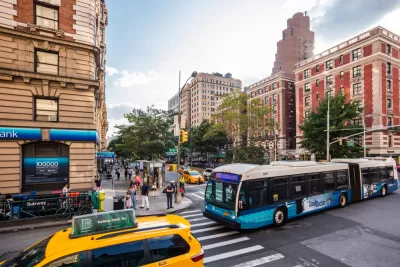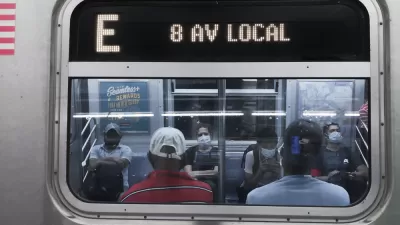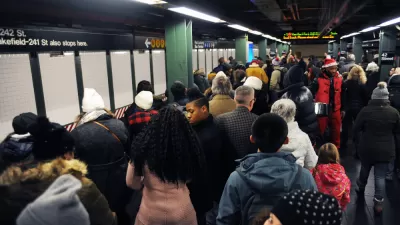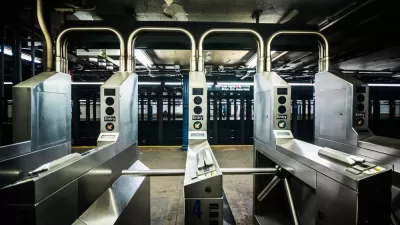Critics of the city's transit assistance program say limiting eligibility to people living at or below the federal poverty line excludes many low-income New Yorkers who depend on public transit.

An article by Niamh Rowe describes New York City mayor Eric Adams' plan to fund the city's Fair Fares transit assistance program, which some critics are calling an inadequate effort to ensure everyone can afford to travel by public transit. According to Rowe, "The plan would cut train and bus fares by half for New Yorkers with incomes at or below the federal poverty level who are not eligible for other transit subsidies or benefits such as those for people with disabilities." The mayor has pledged $75 million to the program for the coming fiscal year, down from $106 million in 2019.
But advocates say the program doesn't go far enough to support New Yorkers who live just above the federal poverty line in one of the country's most expensive cities. According to Danny Pearlstein, policy and communications director of the Riders Alliance, "Two hundred percent of poverty is probably the sweet spot" in New York. Additionally, the program's low visibility means only one-third of eligible New Yorkers are using it. "It can’t be called public transit unless it’s fully accessible to the public," says community organizer Rana Abdelhamid in the article. Advocates like Pearstein and Abdelhamid are calling on the city to raise the budget and widen eligibility for the program.
FULL STORY: The Fair Fares Program Is Staying – for a Few

Study: Maui’s Plan to Convert Vacation Rentals to Long-Term Housing Could Cause Nearly $1 Billion Economic Loss
The plan would reduce visitor accommodation by 25,% resulting in 1,900 jobs lost.

North Texas Transit Leaders Tout Benefits of TOD for Growing Region
At a summit focused on transit-oriented development, policymakers discussed how North Texas’ expanded light rail system can serve as a tool for economic growth.

Using Old Oil and Gas Wells for Green Energy Storage
Penn State researchers have found that repurposing abandoned oil and gas wells for geothermal-assisted compressed-air energy storage can boost efficiency, reduce environmental risks, and support clean energy and job transitions.

Santa Barbara Could Build Housing on County Land
County supervisors moved forward a proposal to build workforce housing on two county-owned parcels.

San Mateo Formally Opposes Freeway Project
The city council will send a letter to Caltrans urging the agency to reconsider a plan to expand the 101 through the city of San Mateo.

A Bronx Community Fights to Have its Voice Heard
After organizing and giving input for decades, the community around the Kingsbridge Armory might actually see it redeveloped — and they want to continue to have a say in how it goes.
Urban Design for Planners 1: Software Tools
This six-course series explores essential urban design concepts using open source software and equips planners with the tools they need to participate fully in the urban design process.
Planning for Universal Design
Learn the tools for implementing Universal Design in planning regulations.
Ascent Environmental
Borough of Carlisle
Institute for Housing and Urban Development Studies (IHS)
City of Grandview
Harvard GSD Executive Education
Toledo-Lucas County Plan Commissions
Salt Lake City
NYU Wagner Graduate School of Public Service





























